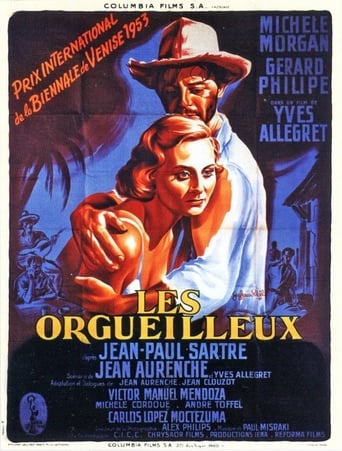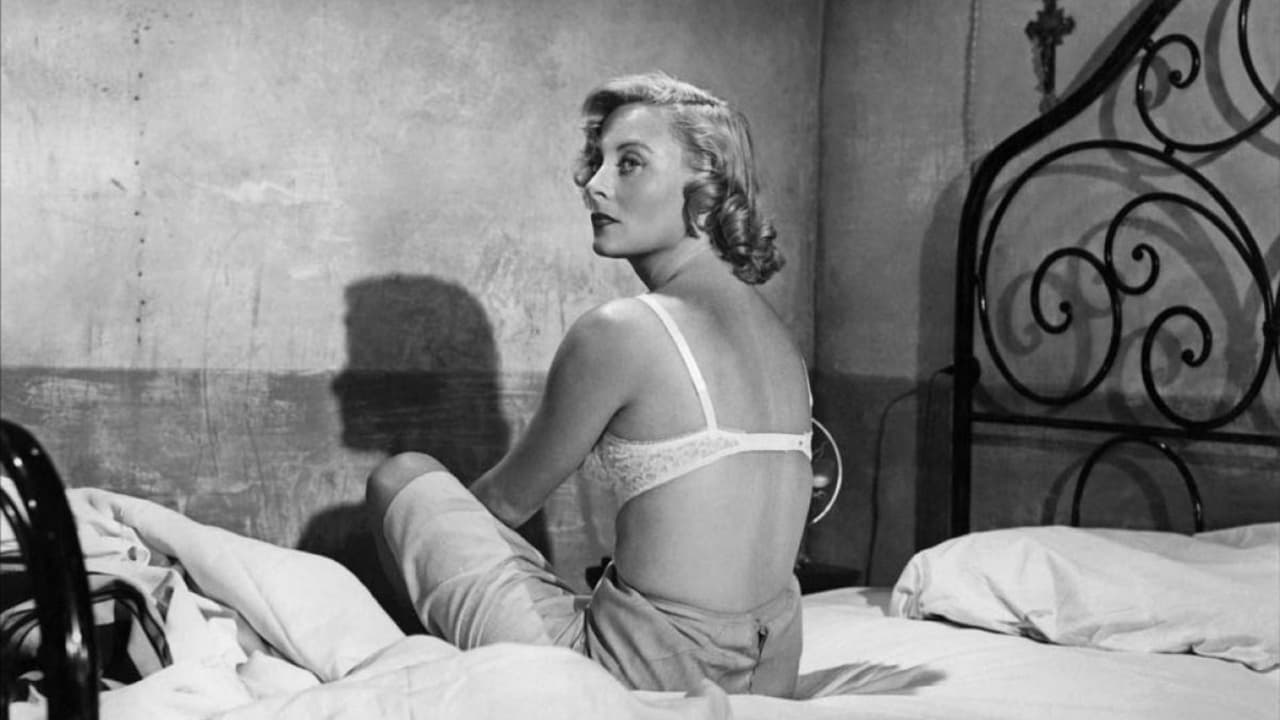richard-1787
I sat through this movie this evening, forcing myself to stick with it even though I never cared about any of the characters or what happened to them, because the two leads, Gérard Philippe and Michèle Morgan, were major film stars of their era and I wanted to see them in "something different," which this certainly was. They both gave fine performances, but of distasteful characters.Indeed, the whole movie is about a shabby little town in Mexico inhabited by almost uniformly distasteful characters (the doctor is, of course, the major exception). What Michèle Morgan ever sees in Philippe to fall in love with him is never explained.This is supposedly based on a work by Jean-Paul Sartre. All I could think was that, if Sartre's work is anything like this movie, it must be a very mediocre attempt at imitating Camus' masterful novel The Plague, which dealt with a plague in North Africa.A well-acted but uninteresting movie.
Cristi_Ciopron
I would like to underline here the symbolical place and representative function of this good compact movie. This is how a clear-cut good movie looks. It is a melodramaand no crap, no ballast, no rubbish. Above all, intelligent, good moviethe obvious touch of a master. In other words, this is what has been lost. This ability, this craftsmanshipvery undervalued and despised and underrated. Far from being a masterpiece, this romance is a good moviewhat I found particularly satisfying, fulfilling, is the absence of the slapdash, of the mess ;fortunately, in its own time Les Orgueilleux did not pass unnoticed. Leprohon saw its merits.It is a good and important movieand also a representative of a schoolit was called the French School. Those who despised this style of movie-making, of fine movie-making, often had nothing to bring instead. A director like Yves Allégret addressed his films to an intelligent cultivated audience.Before we go on with the explanation of this very fine and achieved melodrama's importance, let us try to see what is the constitutive structure of a melodrama. Of a serious and intelligent one, that is. Of a melodrama that does set itself up for something. The first thing we see, dear reader, is the synthetic and somewhat symbolic (the word is not wholly adequate, and it must be taken under caution) language and content of a melodrama. In this film that we are discussing now one can immediately detect this adequacy of the meansthe narrative units, the characters, the psychologies, the mutual relations, the ways, the transitions, are to be taken as merely symbolic (that is, having an immediate aesthetic interest in themselves, and concomitantly standing for a larger meaning that is given in their concrete structure) and synthetic. On the other hand, notice how decently is this made, and how the Mexican characters speaking Spanish are not made to do this by speaking French with a Spanish accent. It might be, this phonetic accuracy, only a modest indicationthough, it says much about this movie, and this old French School director, having the right approach and the right understanding and the right respect for the audience.I believe the symbolical, the reflective ,the synthetic and the generic are the only chance of this sort of literature (or cinema)the non-autobiographical one.All such literature or cinema must choose a synthetic, generic and non-realistic expositionthe choice of the realism for the depicting of the supreme things, such as love and passion, fits only an autobiographic content. In other words, one cannot invent a realistic content for such a fictionhe either speaks strictly about what he has seen and met and lived, or he uses a symbolic, synthetic, compact and non-realistic approachas is the case with this film. It cures the mind of the stupidity with which today's melodramas imbue the mind of their viewers. This curative function is also important.Les Orgueilleux means several things, on many levelsit means what its author intended it to mean;--but it also means the French School in the '50s, right before the scene was taken over almost completely by puck-fists and crumbs who knew only to pot out, 'potchky around and mess uppothooks. And it means the level of excellence in simply making a good movie that was reached by these French School old honest directors. Their detractors reproached them they did not make masterpieces (but they often did !), and suggested that once the French School dismissed, a New Wave will come that will constantly produce only masterpieces.Les Orgueilleux is good, simple, clear and dramatic. It is psychological, thrilling and melodramatic. It means much as the witness of an epoch of normality and competence. This narrative and aesthetic competence is something fine and deeply satisfying. The story is simple and averagebut it is perfectly mastered and managed, very finely developed, very carefully thought. The several characters are well managed. Philippe makes one of his first-hand roles (I do not know very well his career; anyway, here is his best role that I know, and notable also for being an achieved drunkard role, an usually picturesque specialty that Philippe treats in a different and very competent way.) Like all the very great actors, Philippe makes the viewers think he was the only, and anyway the best choice for the role. So someone might ask: if I praise the movie like this, why don't I declare it a masterpiece? Because it is notand, more important, it doesn't pretend it is. It is, deliberately and with supreme mastery and equilibrium, a fine melodrama. If it proves something, it's that a fine melodrama can be rich, impressive and compactthis is its achievement, from a historical point of view.The French School directors were clear-sighted, clear-minded ,not at all muddled, maybe somewhat limited but certainly with a compact knowledge of the technical possibilities of their art; moreover, they did not have the cult of the geniality or, better, the superstition
. Those who replaced the old directors brought sprawl. Someone wrote, very true, that today's melodramas are "patronisingly simplistic, sentimental and tiresome".Indeed.Well,Les Orgueilleux proves there was a time when they didn't have to be so.If you wish, make this test: ask yourself how many recent melodramas seem, next to Les Orgueilleux, anything but crap. I think I could offer several titles of American melodramas from the '50s that are almost as good as Les Orgueilleux, and you may compare the recent melodramas with these '50s American flicks, and the recent ones are still crapand crap out of crap.
Benoît A. Racine (benoit-3)
`Les Orgueilleux' is one of a constellation of worthy French movies of this era that the French stopped making for two reasons: the complete lobotomy of the intellect that was the so-called New Wave and the premature death of Gérard Philipe, one of the century's finest actors. His pairing with Michèle Morgan here is inspired. (They also starred in René Clair's `Les Grandes Manoeuvres'.) In order to describe Philipe's charm, one has to evoke equal parts Leonardo DiCaprio and Laurence Olivier and imagine them cast as romantic leads in the kind of challenging narrative that is not even conceivable today, except for the odd exception. `Les Orgueilleux' is set during a typhus epidemic in a remote Mexican village and is based on Jean-Paul Sartre's novel `L'Amour rédempteur' (`Redeemed by Love', aka `Typhus'). The oversimplification of the novel's themes is compensated by Allégret's penchant for realism and his attention to details, like the long scene of Morgan enduring the discomfort and perils of a lonely hotel room during a heat wave in a third rate Mexican hotel, which is part striptease (daring for the time) and part psychological analysis. In other words, a perfect blend of commercialism and intelligence, both qualities sadly lacking from the aforementioned so-called New Wave.
dbdumonteil
Allegret reached his peak in 1947-1949 with "Dédée d' Anvers" "une si jolie petite plage" and "manèges".Afterwards,his works became either disastrous ("la jeune folle" ) or academic (Zola's "Germinal")."Les orgueilleux" is a notable exception.Gerard Philippe's over the top portrayal of an always drunk deposed doctor is impressive.Michèle Morgan has never been so sensual.But what matters is the sultry moist atmosphere.Michèle Morgan is sweating throughout the whole movie.Very few things happen after Morgan's husband's death,but the depiction of a Mexican one-horse town during the Holy week is awesome.One could draw a parallel(almost bunuelian) between the Passion and Morgan's sentimental life:death on Good Friday of what she thought was the love of her life;resurrection on Easter day on the beach when she realizes she's found true love.Yves Allégret was extraordinary when it came to making you FEEL what his characters endure:so strong the pictures are that we're hot,we sweat as much as them.He did the same in "une jolie petite plage" where the rain never stopped falling.Maybe he learned his lesson from Victor Sjostrom(Seastrom) who could make us feel" the wind" ,and in a silent movie at that.


 AD
AD


